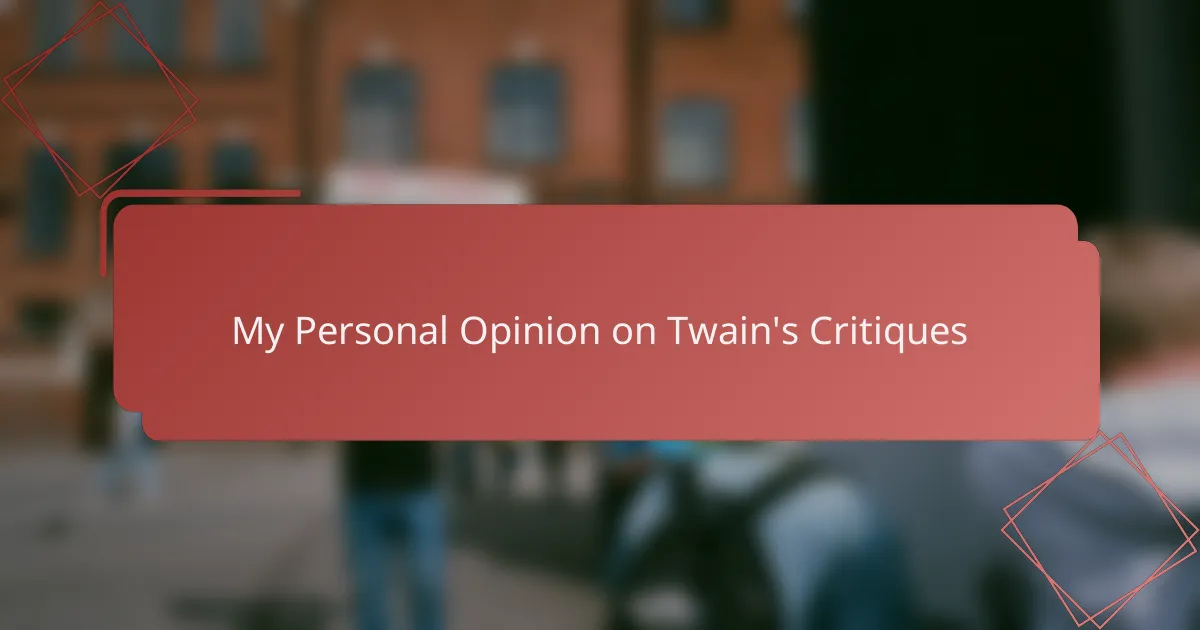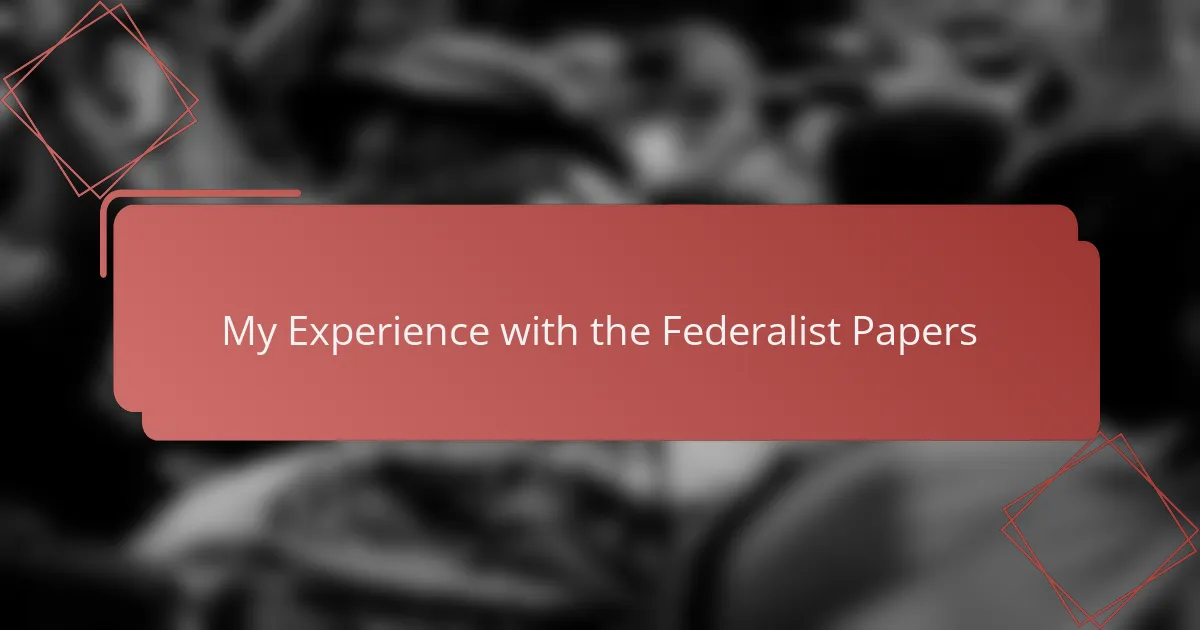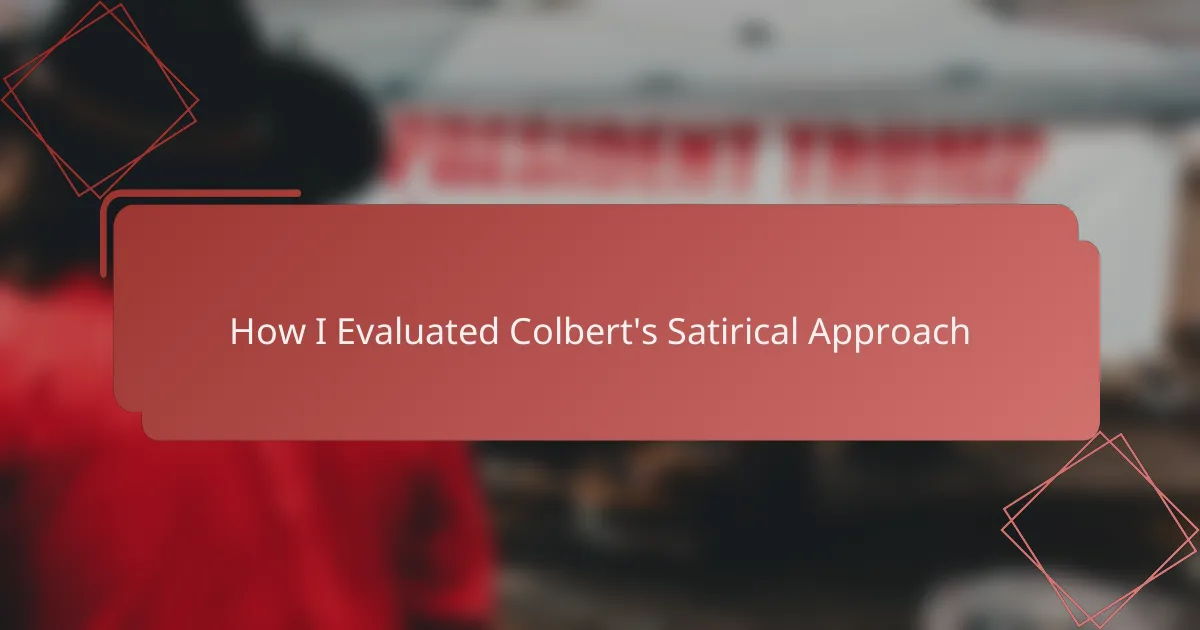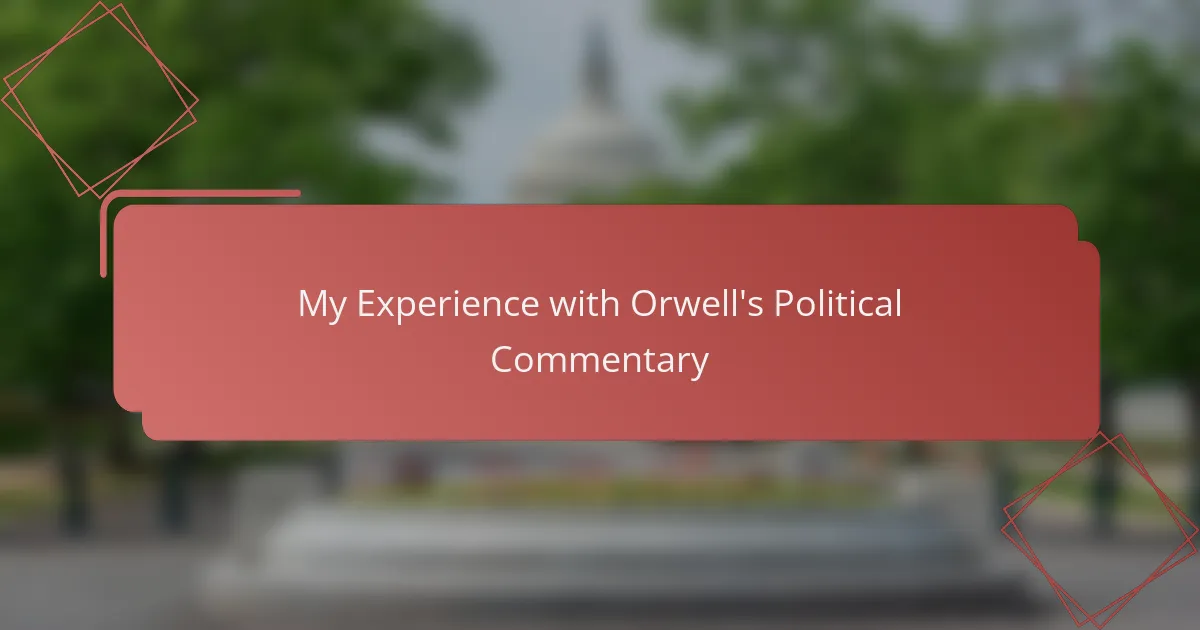Key takeaways
- Political satire, exemplified by Mark Twain, serves to expose societal flaws and provoke critical thought through humor.
- Twain’s techniques, such as irony and exaggeration, make political critiques accessible and engaging while fostering reflection on authority and injustice.
- His satire balances biting wit with moral outrage and empathy, encouraging readers to question power and seek societal change.
- Applying Twain’s methods today can facilitate conversation on complex issues, promoting awareness without defensiveness.
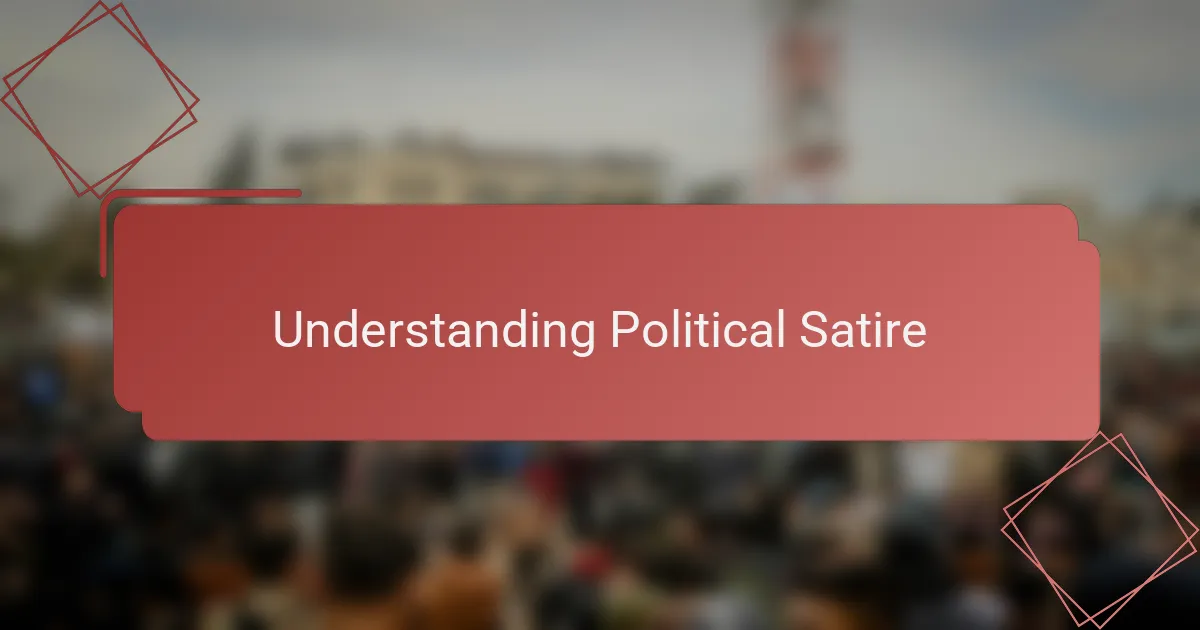
Understanding Political Satire
Political satire, at its core, is a clever way of holding power to account—by making us laugh while exposing uncomfortable truths. I remember the first time I truly appreciated satire; it wasn’t just humor but a mirror reflecting society’s flaws, making me think deeper about the world around me.
Have you ever noticed how satire uses exaggeration and irony not to mock for the sake of mockery but to provoke thought? This strategy can pierce through the noise of daily politics, turning complex issues into something both accessible and memorable.
What fascinates me most is how political satire invites us to question authority without outright confrontation. It’s like a friendly nudge that urges us to stay alert, reminding me that sometimes humor can be the sharpest form of critique.
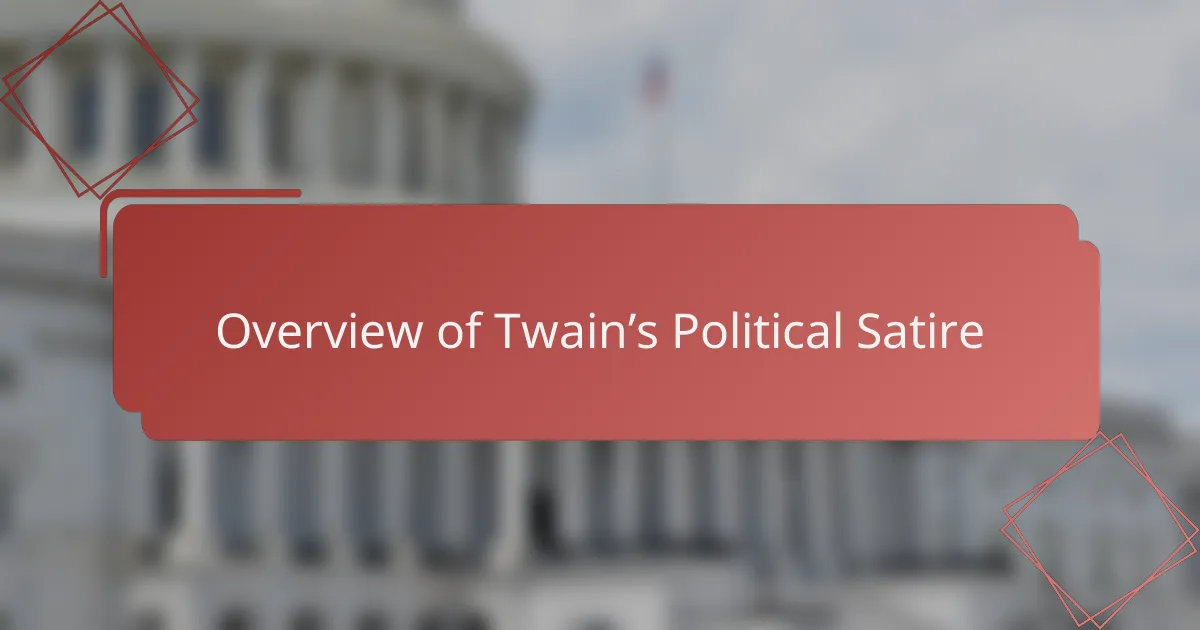
Overview of Twain’s Political Satire
Mark Twain’s political satire is sharp and unyielding, often cutting through hypocrisy with a wit that is both humorous and biting. His critiques stem from a deep frustration with the corruption and moral failures he saw in government, something I’ve found incredibly relatable, especially when reflecting on modern political backdrops.
What strikes me most about Twain’s approach is his ability to pack so much meaning into seemingly simple narratives. He didn’t just mock politicians for the sake of humor; he exposed systemic flaws with a cleverness that still resonates today. Here are a few key elements of his political satire that I find especially powerful:
- Use of irony to highlight contradictions in political rhetoric versus actions
- Straightforward language that makes complex political issues accessible
- Characters representing common people caught in the machinery of power
- Sarcasm targeting political greed and social injustice
- A keen sense of moral outrage disguised as humor, prompting readers to think deeper
- Critiques rooted in specific historical context, yet universal in their themes
This blend of humor and harsh truths makes Twain’s satire endlessly relevant and personally impactful to me as someone engaged in political discourse.
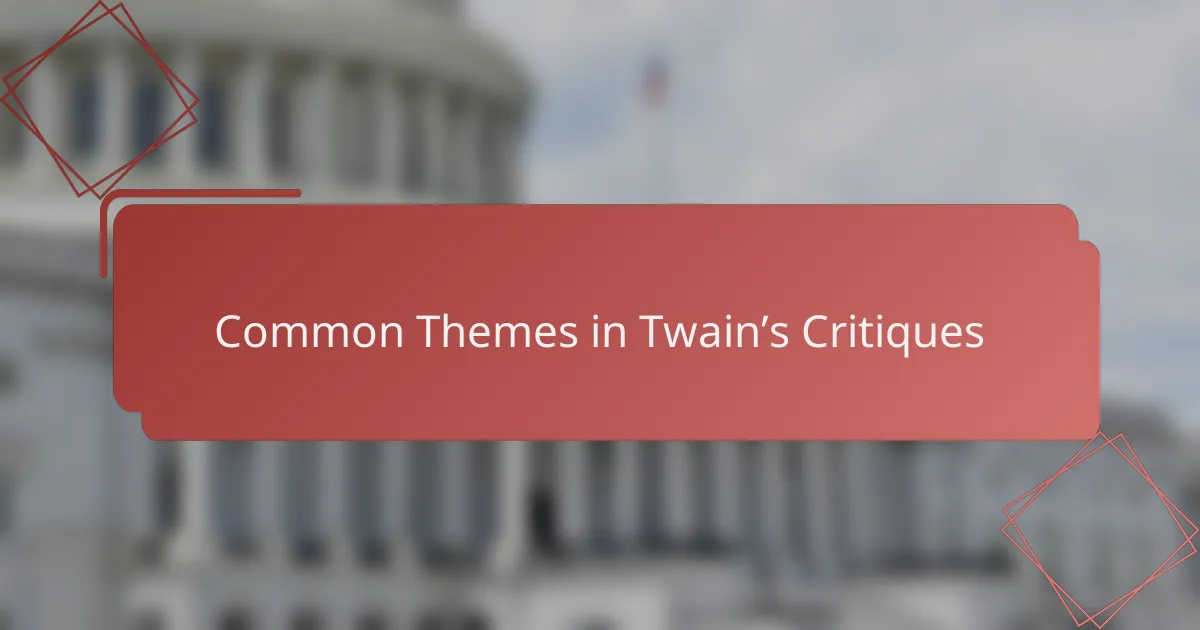
Common Themes in Twain’s Critiques
Mark Twain’s critiques often circle around hypocrisy, corruption, and the follies of society. From my observations, he had an uncanny ability to expose these issues with sharp wit yet underlying empathy, making his satire both stinging and relatable. I recall reading his works and feeling a mix of amusement and discomfort, realizing how relevant his points still are today.
What strikes me most is Twain’s skill in balancing humor with serious criticism. He didn’t just mock for laughs; he challenged readers to reflect on political and social inconsistencies, something I deeply appreciate in satire. His themes feel timeless, reminding me why satire remains a powerful tool for social commentary.
| Common Theme | Twain’s Approach |
|---|---|
| Hypocrisy | Exposes societal double standards with irony and humor |
| Corruption | Critiques political greed and moral decay through vivid storytelling |
| Human Follies | Uses exaggeration to reveal irrational behaviors and social absurdities |
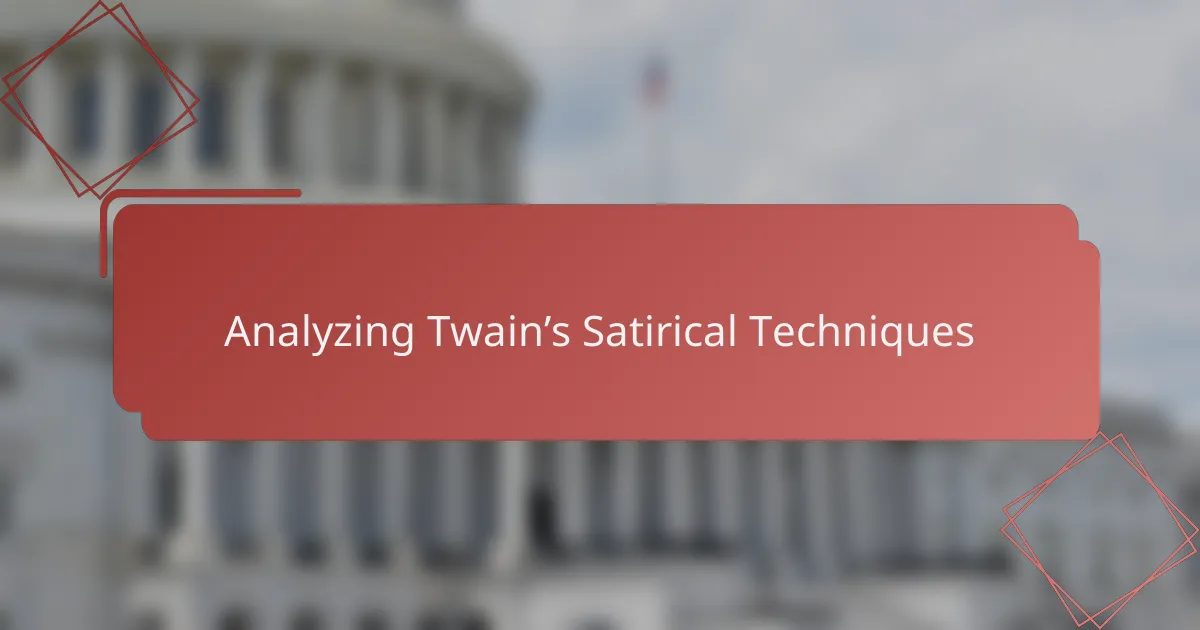
Analyzing Twain’s Satirical Techniques
Mark Twain’s satirical style is a masterclass in subtlety and sharp wit. What strikes me most is his ability to blend humor with biting social critique, making political flaws not just visible but impossible to ignore. From my perspective, this approach engages readers emotionally, inviting reflection without heavy-handedness.
I recall reading Twain’s works during a particularly cynical political period, and his satirical techniques gave me a sense of relief and clarity. His use of irony and exaggeration feels like a clever mirror held up to society’s absurdities, which is why his critiques remain so relevant and impactful.
| Satirical Technique | Description & Personal Insight |
|---|---|
| Irony | Twain’s irony flips expectations, often exposing hypocrisy. I find this technique powerful because it subtly undercuts the subject, forcing me to rethink accepted norms. |
| Exaggeration | His exaggeration magnifies political follies to absurdity. It’s like a spotlight revealing flaws we usually overlook, which makes the satire both entertaining and thought-provoking. |
| Parody | Twain parodies political speeches and social behaviors, making the ridiculous unmistakable. Experiencing this in his work feels like a clever invitation to question authority without feeling attacked. |
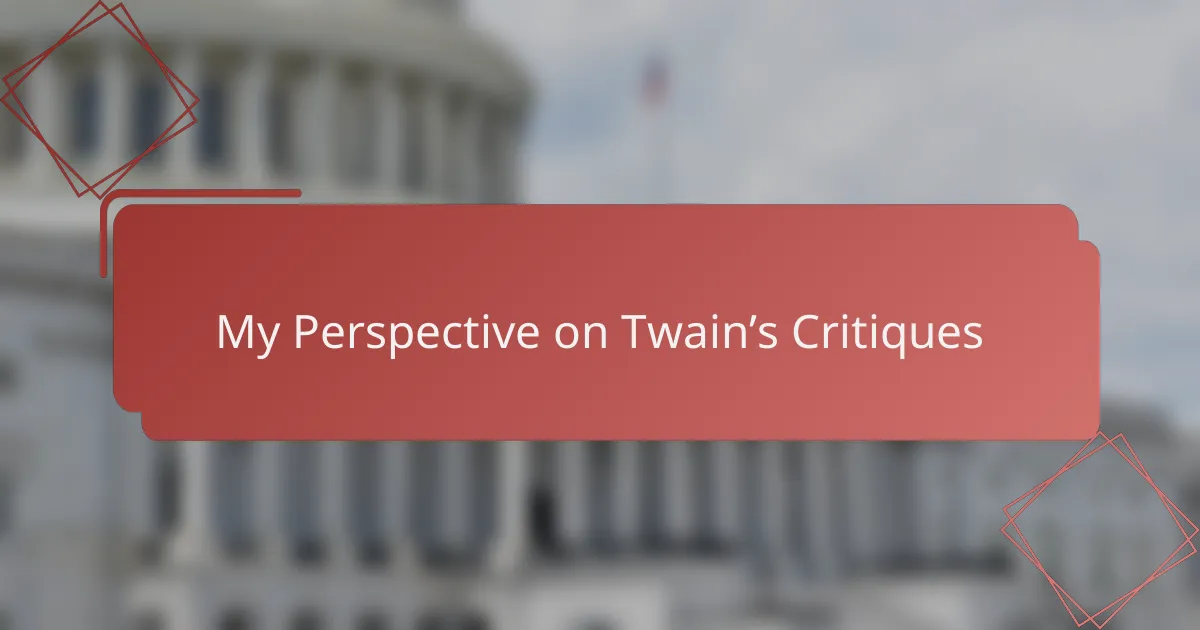
My Perspective on Twain’s Critiques
My take on Twain’s critiques is that they strike a unique balance between biting wit and heartfelt concern. When I read his satirical works, I’m often struck by how his sharp humor delivers powerful political messages without losing its charm. It reminds me of a time when I used humor to ease a tense political discussion among friends—the truth often lands better when wrapped in laughter.
| Aspect | My Perspective |
|---|---|
| Tone | Witty yet sincere, combining humor with genuine critique |
| Effectiveness | Engages readers emotionally and intellectually through satire |
| Relevance | Continues to resonate today because of its timeless political insights |
| Personal Impact | Encouraged me to use humor as a tool for discussing serious topics |
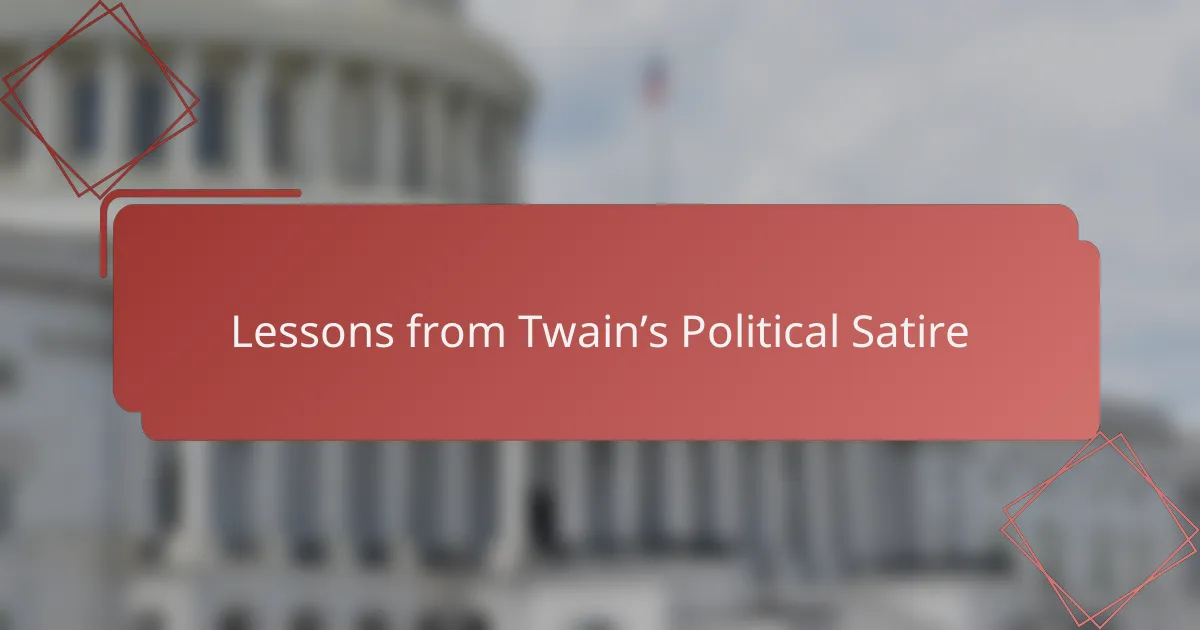
Lessons from Twain’s Political Satire
What I find most instructive in Twain’s political satire is how he wields humor as a scalpel rather than a sledgehammer. Have you ever noticed how laughter can open your mind to uncomfortable truths in a way that a stern lecture never will? Twain’s lessons remind me that satire’s true power lies in its gentle yet incisive call for self-awareness and societal change.
Another lesson I take to heart is Twain’s mastery of simplicity. His straightforward language turned complex political corruption into stories that anyone could grasp. This makes me wonder: why do we often shy away from making political critique so accessible? Twain shows that clarity can amplify both the humor and the impact of satire.
Finally, Twain teaches us that satire should come from a place of moral outrage balanced with empathy. I remember feeling both amused and unsettled reading his works, realizing that beneath the humor was a deep care for justice and fairness. Isn’t that what makes satire worth its salt—challenging power while still connecting with the shared human experience?
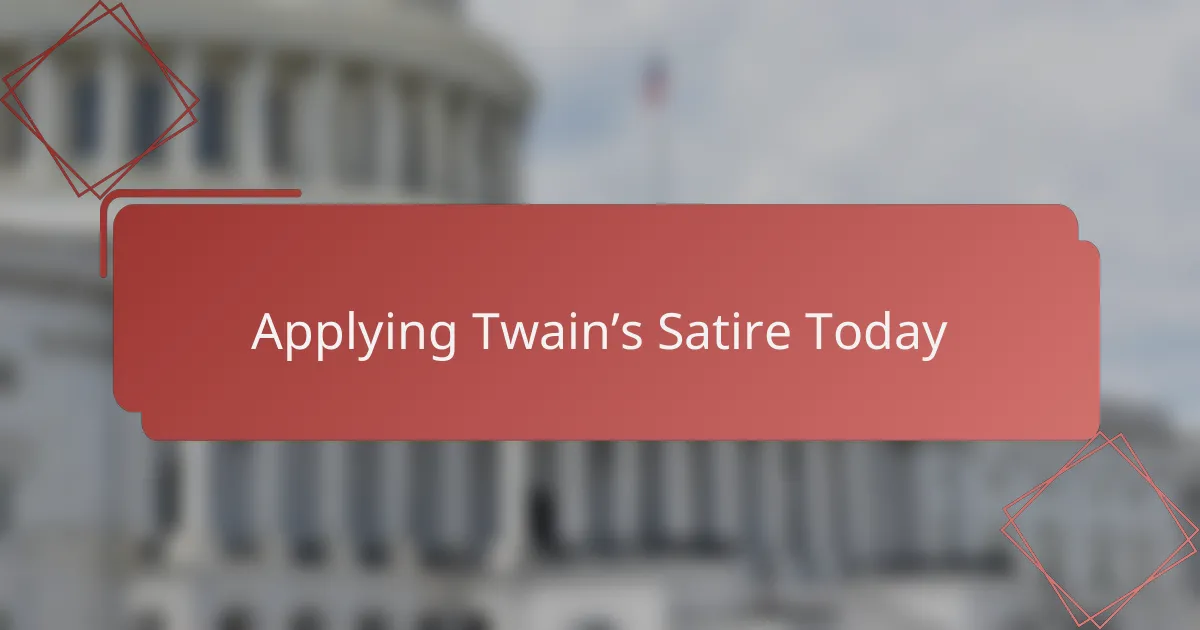
Applying Twain’s Satire Today
Applying Twain’s satire today feels surprisingly straightforward, yet profoundly challenging. When I look around at current politics, the same contradictions and absurdities Twain spotlighted still pop up everywhere. Doesn’t it make you think how satire, like his, can cut through the noise and remind us not to take everything at face value?
I’ve found that applying Twain’s techniques—especially his use of irony and straightforward storytelling—can create a space for conversation without triggering immediate defensiveness. Have you ever noticed how humor can open a door that serious debate often slams shut? That’s exactly where Twain’s satire shines for me, encouraging reflection wrapped in wit.
Sometimes, I wonder if today’s satirists capture the same moral urgency Twain had. To me, his blend of empathy and outrage is a blueprint worth revisiting. When satire balances genuine concern with sharp critique, it not only entertains but also nudges us toward real change—something I believe we desperately need in today’s polarized world.
